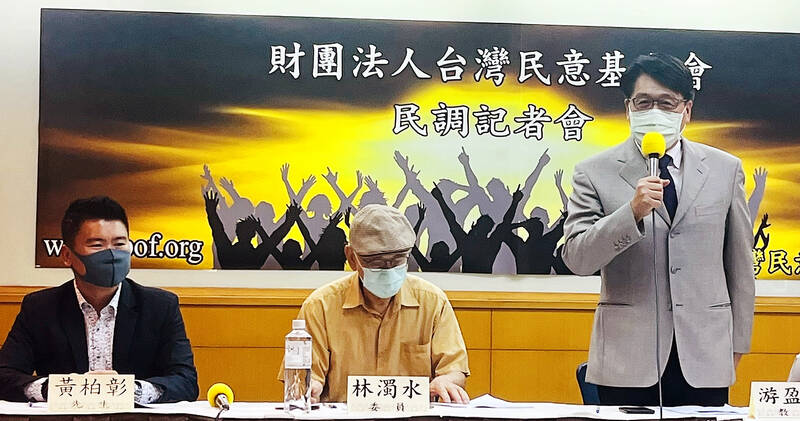A slight majority of Taiwanese lack confidence in the government’s ability to defend the nation, the results of a poll published yesterday by the Taiwanese Public Opinion Foundation showed.
The survey showed that 51.5 percent of respondents were not confident in the government’s ability to defend the nation against a hypothetical Chinese invasion, comprising 21.1 percent who “somewhat” lacked confidence and 30.4 who had “no confidence,” the foundation told a news conference in Taipei.
It showed that 41.2 percent have confidence in the government’s ability to defend Taiwan, comprising 13.9 percent of the total who were “highly confident” and 27.3 percent who were “somewhat confident.”

Photo: Chen Yu-fu, Taipei Times
The foundation said 4.2 percent of respondents had no opinion, while the remainder said they did not know.
President Tsai Ing-wen’s (蔡英文) management of cross-strait ties garnered 48.6 percent approval among the respondents, comprising 15.5 percent who “highly approved” and 33.1 percent who “somewhat approved,” the survey showed.
However, 43.3 percent did not approve of her management of cross-strait ties, comprising 19.1 percent who “somewhat disapproved” and 24.3 percent who “highly disapproved,” the foundation said, adding that 6.1 percent had no opinion.
The poll found that 43.6 percent agreed that Taiwan’s armed forces have responded weakly to China’s military threats, while 42.4 percent disagreed with the statement, it said, adding that 7 percent expressed no opinion.
Asked whether Taiwan or China would win if a conflict were to start tomorrow, 29.6 percent said Taiwan, 51.2 percent said China and 10.7 percent said the result would be too close to call, it said.
Asked which country would win the Russia-Ukraine war, 47.4 percent said Ukraine, 25.1 percent said Russia and 13.9 percent said the result is too close to call, the poll showed.
The public’s lack of confidence in the nation’s defenses suggests that Taiwanese either think the nation’s armed forces are less prepared than Ukraine’s, or the world would not support Taiwan in the event of a Chinese attack, former legislator and political commentator Lin Cho-shui (林濁水) said.
As the US has turned its strategic focus on the Asia-Pacific region and needs to protect the microchip supply chain for economic reasons, Taiwan should be in a better position than Ukraine to garner Washington’s support, Lin said.
US President Joe Biden has said on multiple occasions that the US would defend Taiwan if China were to invade, he said.
These considerations indicate that Taiwanese’s anxiety about national defense stems from a lack of confidence in the armed forces, he said.
Still, the poll showed public confidence in the military has improved since the Chinese Nationalist Party (KMT) held the presidency, Lin said.
The survey among Taiwanese of voting age was conducted on Monday and Tuesday last week by telephone, collecting 1,005 valid samples. It has a confidence level of 95 percent and a margin of error of 3 percentage points.

Several Chinese Nationalist Party (KMT) officials including Chairman Eric Chu (朱立倫) are to be summoned for questioning and then transferred to prosecutors for holding an illegal assembly in Taipei last night, the Taipei Police said today. Chu and two others hosted an illegal assembly and are to be requested to explain their actions, the Taipei City Police Department's Zhongzheng (中正) First Precinct said, referring to a protest held after Huang Lu Chin-ju (黃呂錦茹), KMT Taipei's chapter director, and several other KMT staffers were questioned for alleged signature forgery in recall petitions against Democratic Progressive Party (DPP) legislators. Taipei prosecutors had filed

Taiwan would welcome the return of Honduras as a diplomatic ally if its next president decides to make such a move, Minister of Foreign Affairs Lin Chia-lung (林佳龍) said yesterday. “Of course, we would welcome Honduras if they want to restore diplomatic ties with Taiwan after their elections,” Lin said at a meeting of the legislature’s Foreign Affairs and National Defense Committee, when asked to comment on statements made by two of the three Honduran presidential candidates during the presidential campaign in the Central American country. Taiwan is paying close attention to the region as a whole in the wake of a

President William Lai (賴清德) has appointed former vice president Chen Chien-jen (陳建仁) to attend the late Pope Francis’ funeral at the Vatican City on Saturday on his behalf, the Ministry of Foreign Affairs said today. The Holy See announced Francis’ funeral would take place on Saturday at 10am in St Peter’s Square. The ministry expressed condolences over Francis’ passing and said that Chen would represent Taiwan at the funeral and offer condolences in person. Taiwan and the Vatican have a long-standing and close diplomatic relationship, the ministry said. Both sides agreed to have Chen represent Taiwan at the funeral, given his Catholic identity and

Lawmakers from the Democratic Progressive Party (DPP) yesterday established a friendship group with their counterparts in Ukraine to promote parliamentary exchanges between the two countries. A ceremony in Taipei for the Taiwan-Ukraine Parliamentary Friendship Association, initiated by DPP Legislator Chen Kuan-ting (陳冠廷), was attended by lawmakers and officials, including Deputy Minister of Foreign Affairs Francois Wu (吳志中) and European Economic and Trade Office in Taiwan Director Lutz Gullner. The increasingly dire situation in Ukraine is a global concern, and Taiwan cannot turn its back when the latter is in need of help, as the two countries share many common values and interests,